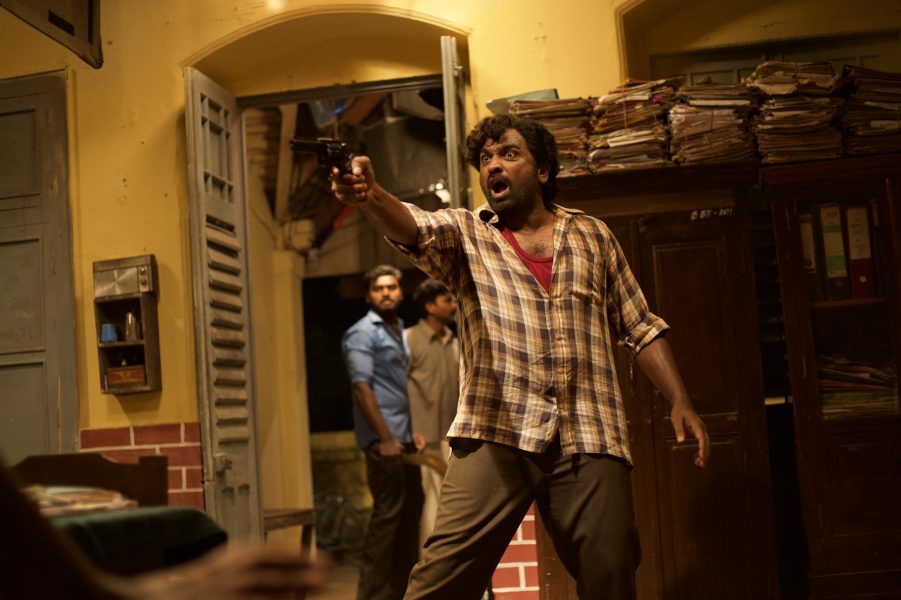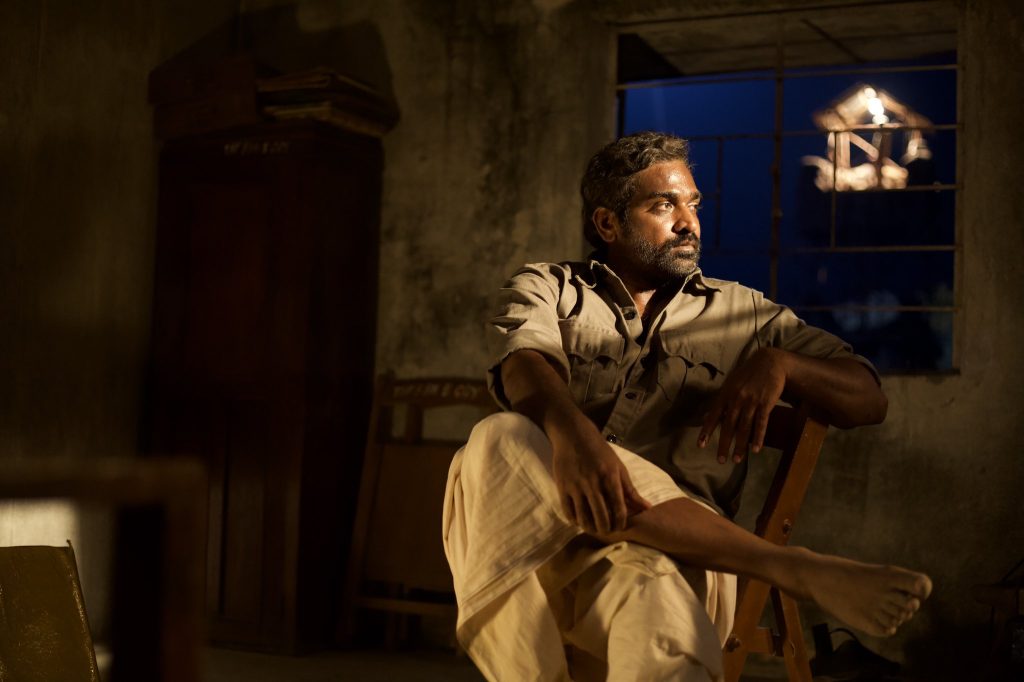
Viduthalai 1 row: ‘Inspiration’ from Left, credits for Right-wing author
While director it was inspired by Jeyamohan's short story, some claim it was from Balamurugan’s novel

Tamil filmmaker Vetrimaaran’s latest outing, Viduthalai Part 1, which released in theatres on March 31, is being received well for its gripping story and narration, despite allegations of plagiarising the storyline. Starring Soori, Bhavani Sre, Vijaya Sethupathi, Chetan, Rajiv Menon and Gautam Menon, the film delves into the police atrocities that happened in the year 1987 in Tamil Nadu.
Although the film includes a disclaimer through the voice of director Vetrimaaran, stating that it is an imaginary story, it draws inspiration from real-life incidents and some literary works. Vetrimaaran is known for being a voracious reader and for adapting literary works to the big screen.
He has earned goodwill from writers for properly crediting them in the title cards. However, it is alleged that he made a slip-up in this film by not providing proper acknowledgement. This issue has become a bone of contention in the film, which is otherwise receiving praise for the political issues it addresses.
From Vathiyar to Veerappan
The film’s central plot revolves around the capture of a rebel leader known as Vathiyar, who is the target of ‘Operation Ghost Hunt’. The character Perumal Vathiyar, played by Vijay Sethupathi, is said to be inspired by Pulavar K Kaliyaperumal, the real-life rebel leader and founder of Makkal Padai. This left-wing group fought against the feudal lords in and around the Cuddalore district. The objective of the operation is to capture Vathiyar, either alive or dead.
Also read: As ‘Viduthalai’ shows, Vetrimaaran is a filmmaker who never disappoints
Kaliyaperumal was born on March 4, 1924, at Sundaracholapuram in Cuddalore. As a Tamil teacher, he earned the nickname ‘Pulavar’ (which was commonly used to refer to Tamil teachers at the time) — a name that has been changed into Vathiyar in the film.
Initially, Kaliyaperumal was drawn to Periyar’s Self-Respect Movement, but later shifted his ideology towards Communism and then the Naxal movement. When Charu Majumdar of the Naxalbari movement visited Tamil Nadu in 1969, Kaliyaperumal organised a meeting in Trichy district where Majumdar was the chief guest. Due to his close association with the Naxal movement, his own group was often referred to as the ‘First Naxalbari Movement of Tamil Nadu.’

Kaliyaperumal was arrested in 1971 on charges of murder and was initially awarded the death sentence. Later, his sentence was commuted to life imprisonment, and he was released after 12 years. In 2006, he wrote his autobiography, Makkal Thunaiyodu Maranathai Vendren. A year later, he passed away on May 16.
Secondly, the film portrays police brutality as they resort to third-degree torture on tribal people in an attempt to capture Vathiyar. This part of the story is said to be inspired by real-life incidents during ‘Operation Cocoon’, which was formed by the Tamil Nadu police in the early 2000s to hunt down the forest brigand Veerappan. The search operations depicted in the movie are reminiscent of events like the Vachathi Violence that occurred in 1992 in Dharmapuri district.
Also read: Jubilee review: A lavish ode to Hindi cinema, an epic tale of ambition and stardom
Thirdly, the film begins with a dramatic train accident caused by a bomb blast on a bridge. This sequence was inspired by a real-life train accident that occurred in the Ariyalur district of Tamil Nadu in 1987. The group responsible for the destruction of the Marudayar bridge — which connected Chennai and Trichy through Rockfort Express train — was the Tamil Nadu Viduthalai Padai (Tamil Nadu Liberation Army), led by Ponparappi Thamizharasan. Thamizharasan’s political mentor was none other than Pulavar Kaliyaperumal. It is interesting to note that the character of Vathiyar in the film operates ‘Thamizhar Viduthalai Padai’, which is inspired from real life movement.
What went wrong?
During the making of the film, Vetrimaaran claimed that its story was inspired by a short story ‘Thunaivan’, written by B. Jeyamohan, who is a fierce supporter of rightwing politics. It is the story of a Left rebel leader named Konar, who was shot in an encounter. It was first published in a Tamil weekly Ananda Vikatan in 1992. The story had a contentious reception among the left-leaning readers and critics, who felt that it was insensitive to the internal conflicts and struggles within left-wing factions. Many believed that the story trivialized and mocked these divisions.
However, some filmmakers, such as Kavitha Bharathy, claim that Jeyamohan’s short story was itself inspired by the murder of CPI(ML) leader Arikkad Varghese — the first encounter killing in Kerala — in 1970. Varghese was a Naxalite leader, and the truth about his death only came to light 20 years later, when Ramachandran Nair, one of the policemen involved, revealed the details in a series of memoirs published in Deshabhimani.
Also read: First Tamil cli-fi novel gives glimpse of lives of global climate refugees
However, contrary to his claim that Viduthalai was inspired by Jeyamohan’s story, the final outcome shows that he allegedly lifted many of the scenes from the book Solakar Thoddy (2013) authored by S Balamurugan, an advocate and a member of the People’s Union of Civil Liberties.
‘Losing intellectual integrity’
In Solakar Thoddy, a novel, the author recounts the harrowing police atrocities during the hunt for Veerappan. “Particularly, the ‘workshop’ (the police investigation cell in the camp, where third degree police atrocities were unleashed during the hunt) scenes could have been inspired from my book. The novel also had a character named Subash, a humane police constable, which could have become an inspiration for Soori’s character,” said Balamurugan in a statement.
He added that a filmmaker like Vetrimaaran, who serves as a role model for budding filmmakers, should have made a film with ‘an intellectual integrity’. “He should have avoided altering real-life incidents, creating false connections between a real incident and an event in history, and modifying the work of others while taking credit for their contribution. His film has lost its creative morality because of this,” he said.
While Vetrimaaran has given credits to another writer R Bharathinathan, the author of the novel Thariyudan, which also had a considerable impact on him during the making of this film, he has not acknowledged Balamurugan at all. Intriguingly, despite Vetrimaaran’s claim that Jeyamohan’s story was an inspiration, the film does not contain any scenes from it. The reason behind Vetrimaaran’s statement is best known only to him.

